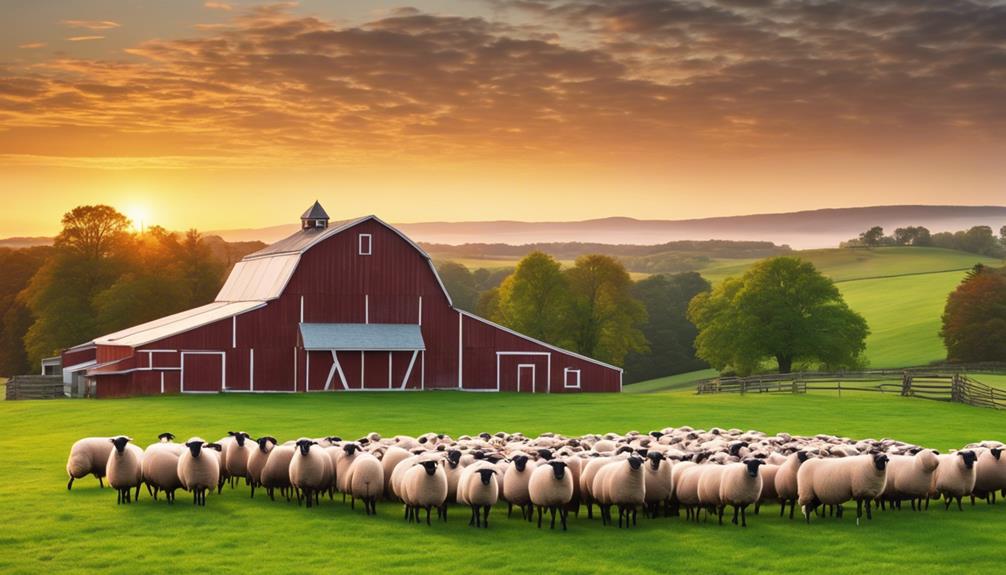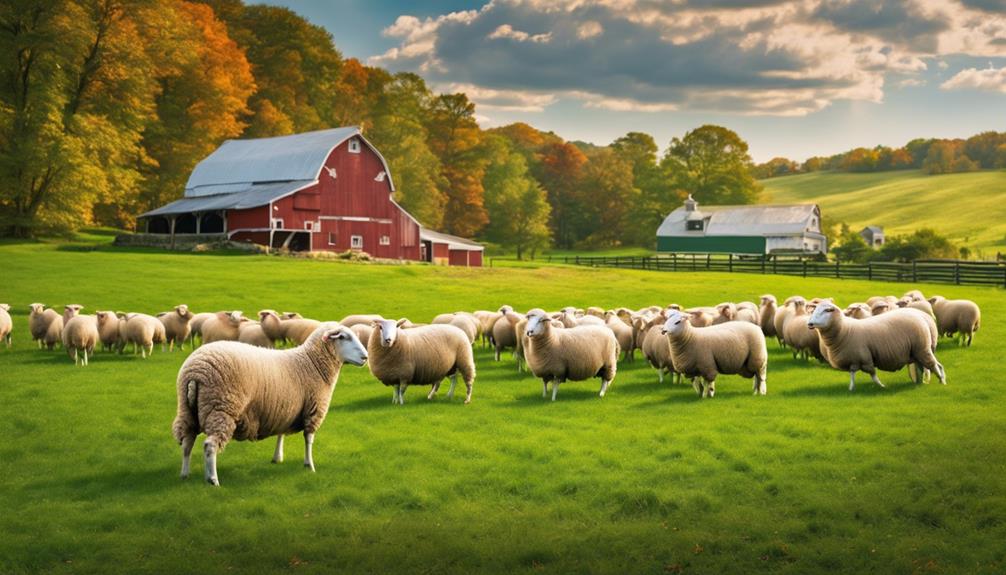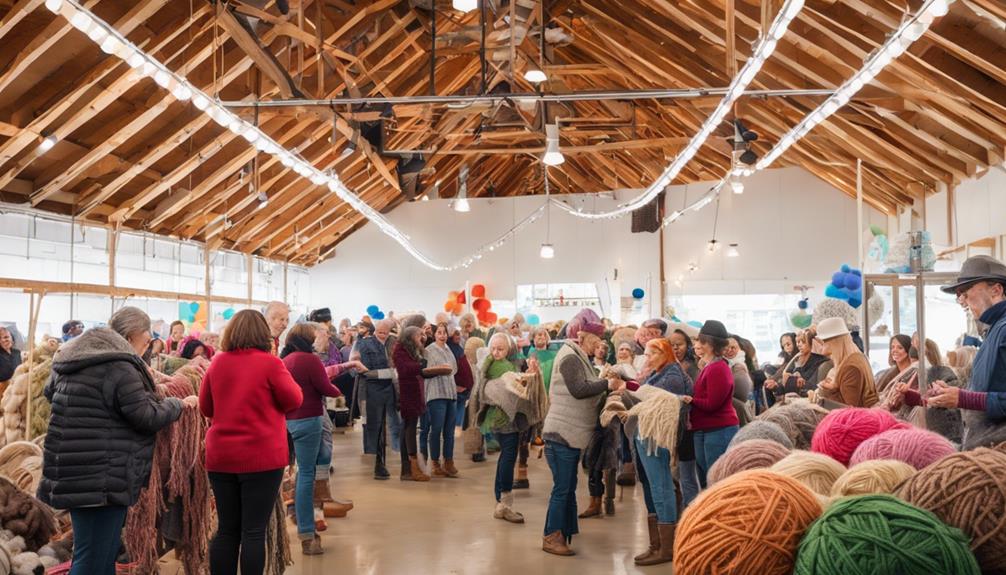Immerse yourself in the world of sheep farming and wool production in New Jersey. Delve into the vibrant community of breeders, artisans, and enthusiasts who uphold sustainable practices and showcase exquisite craftsmanship. From effective flock management to wool processing techniques, each aspect is tailored for quality and innovation. Discover the rich heritage and diverse range of wool products that highlight the eco-friendly and versatile nature of local wool. Join a welcoming community that fosters creativity and knowledge-sharing, offering workshops and demonstrations for skill enhancement. Embrace the traditions and modern practices that shape the unique world of NJ sheep and wool.
Key Takeaways
- NJ sheep farming emphasizes flock management and breeding strategies for quality wool.
- Sussex County breeders focus on selective breeding for superior wool production.
- Fiber festivals in Princeton offer workshops, demonstrations, and high-quality wool products.
- Sustainable practices in sheep husbandry prioritize animal welfare and land conservation.
- Diverse wool products from NJ showcase local craftsmanship, eco-friendliness, and vibrant colors.
Sheep Farming in New Jersey

When considering sheep farming in New Jersey, it's important to grasp the unique challenges and opportunities that come with raising sheep in this region. Flock management plays a significant role in guaranteeing the health and productivity of your sheep. Implementing effective breeding strategies tailored to the local climate and resources can enhance the overall quality of your flock. By selecting breeding pairs carefully, you can work towards developing a resilient and high-performing lineage that's well-suited to the New Jersey environment.
In addition to flock management and breeding strategies, pasture rotation and grazing techniques are essential components of successful sheep farming in New Jersey. Proper pasture rotation helps prevent overgrazing, promotes grass regrowth, and minimizes the risk of parasite infestations.
Implementing strategic grazing techniques not only ensures that your sheep have access to fresh and nutritious forage but also helps maintain the health of your pastures over the long term.
Wool Processing Techniques
To achieve peak quality in your wool products, mastering efficient wool processing techniques is crucial. When it comes to spinning techniques, make sure you have the right equipment for carding and combing the wool to create smooth and even yarn.
Experiment with different felting methods like wet felting or needle felting to add unique textures and patterns to your wool creations.
For vibrant and personalized wool products, explore various dyeing processes such as natural dyeing or acid dyeing to achieve the desired color shades.
Additionally, stay updated on the latest knitting patterns to keep your wool products trendy and appealing.
By combining these essential wool processing techniques effectively, you can produce high-quality wool items that aren't only visually pleasing but also durable and long-lasting.
Experimenting with different techniques won't only enhance your skills but also add a personal touch to your wool creations.
Sussex County Sheep Breeders

Explore the diverse community of Sussex County sheep breeders who are dedicated to raising and promoting high-quality sheep breeds. These breeders are deeply involved in breeding programs that aim to enhance sheep genetics for superior wool production and overall animal health. By focusing on selective breeding and genetic diversity, Sussex County sheep breeders endeavor to maintain and improve the quality of their flocks.
To highlight the importance of breeding programs and sheep genetics in Sussex County, consider the following table:
| Aspect | Description |
|---|---|
| Breeding Programs | Breeders actively engage in programs that emphasize selective breeding techniques to enhance desirable traits in sheep breeds. |
| Sheep Genetics | Emphasis is placed on understanding and utilizing sheep genetics to produce flocks with superior wool quality, disease resistance, and overall vitality. |
Through their dedication to breeding programs and a deep understanding of sheep genetics, Sussex County sheep breeders play a pivotal role in sustaining the excellence of sheep farming in the region.
Fiber Festivals in Princeton
Participating in Fiber Festivals in Princeton offers a unique opportunity to immerse yourself in the vibrant world of fiber arts and crafts. At these festivals, you can engage in hands-on fiber art workshops to learn new techniques or refine your skills. Local vendors showcase a wide array of high-quality fibers, yarns, and tools for all your crafting needs.
One of the highlights of these festivals is the sheep shearing demonstrations, where you can witness skilled shearers deftly removing fleece from the sheep. It's a fascinating process that connects you directly to the source of the fibers used in your crafts.
Additionally, yarn spinning demonstrations provide insight into how raw fibers are transformed into beautiful yarns ready for knitting or weaving.
Sustainable Practices in Sheep Husbandry

Witnessing the sheep shearing demonstrations at fiber festivals in Princeton provides insight into sustainable practices in sheep husbandry, connecting attendees directly to the source of the fibers used in crafts.
Sustainable sheep husbandry involves careful grazing management and pasture rotation to guarantee the land isn't overgrazed, allowing the pastures to regenerate naturally. By rotating the sheep to different pastures, the grass has time to recover, reducing erosion and maintaining soil health.
In addition to grazing practices, animal welfare is a paramount concern in sustainable sheep husbandry. Breed selection plays an essential role in this aspect, as certain breeds are better adapted to local conditions and require less intensive management. Choosing breeds that thrive in the local climate and landscape promotes better animal health and reduces the need for artificial interventions.
Wool Products From Nj Sheep
Discover the diverse range of wool products sourced from New Jersey sheep, showcasing the local craftmanship and quality of these sustainable fibers.
Wool from New Jersey sheep isn't only eco-friendly but also versatile, making it ideal for various wool fashion pieces and knitting techniques. The wool spun from these sheep is known for its softness and warmth, perfect for creating cozy sweaters, scarves, and hats.
In addition to its natural properties, wool from New Jersey sheep can be enhanced through natural dyeing processes, allowing for a spectrum of vibrant and unique colors in the final products. This natural dyeing method not only adds aesthetic value but also promotes sustainability in the production of wool fashion items.
Moreover, the wool spinning techniques employed by local artisans guarantee that each product is crafted with precision and care. These techniques, combined with the high-quality wool sourced from New Jersey sheep, result in durable and luxurious wool products that are truly one-of-a-kind.
Community of Wool Enthusiasts

Join the vibrant community of wool enthusiasts who appreciate the artistry and sustainability behind New Jersey sheep wool products. This community offers a space for individuals to come together, learn, and share their passion for all things wool-related. Engage in knitting workshops where you can hone your skills, exchange ideas, and create beautiful handmade pieces. Explore wool spinning techniques with experienced artisans who can guide you through the intricate process of turning raw wool into yarn.
—
| Community Resources | Description |
|---|---|
| Knitting Workshops | Participate in hands-on sessions to improve your knitting skills and connect with fellow enthusiasts. |
| Wool Spinning Techniques | Learn from experts the traditional and modern methods of spinning wool to create unique yarn for your projects. |
—
Immerse yourself in a supportive environment where creativity flourishes, knowledge is shared, and friendships are formed. Whether you are a seasoned crafter or just starting, the community of wool enthusiasts welcomes you with open arms.
Conclusion
You've learned about the thriving sheep and wool industry in New Jersey, from farming and processing techniques to local breeders and festivals. Sustainable practices are key, and the community of wool enthusiasts is strong.
Next time you see a wool product from NJ sheep, you'll appreciate the hard work and dedication that goes into creating it. Keep supporting local farmers and wool producers in the Garden State!